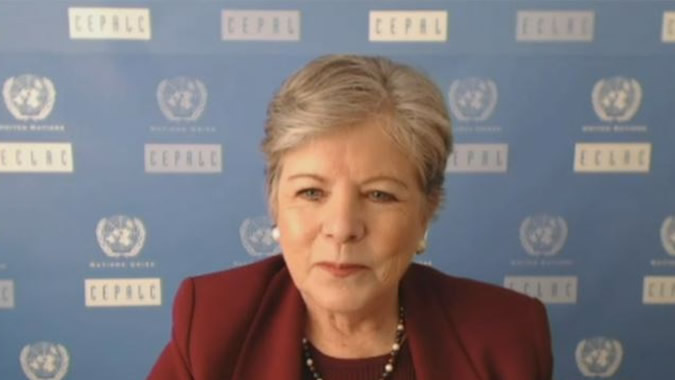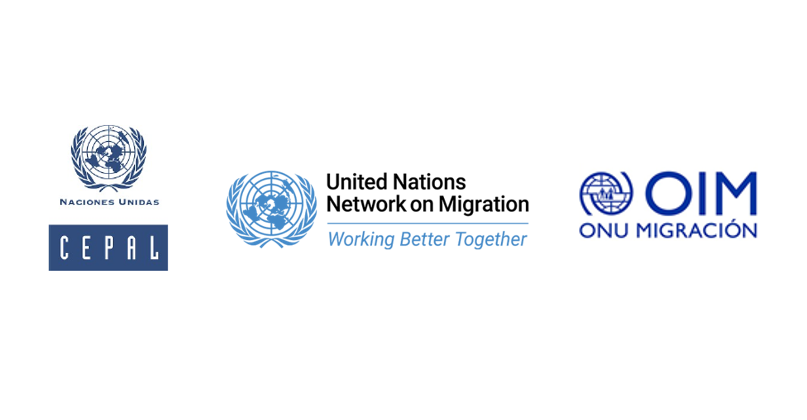Experts Call to Address the Human Rights of Migrants as a Priority during the Post Pandemic Recovery
Work area(s)
Alicia Bárcena, ECLAC’s Executive Secretary, Antonina Sasieta, Peru’s Minister of Women and Vulnerable Populations, and Harold Robinson, UNFPA’s Regional Director for Latin America and the Caribbean, took part in a virtual conversation on the impacts of COVID-19 on migrants.

A group of experts from the region made a call today to address the rights of migrants as a priority and consider the role of migration in the post COVID-19 economic and social recovery, during a virtual conversation held in the context of the Regional Conference on Population and Development in Latin America and the Caribbean.
The event, entitled The impacts of COVID-19, an opportunity to reaffirm the central importance of the human rights of migrants in sustainable development, was inaugurated by Alicia Bárcena, Executive Secretary of the Economic Commission for Latin America and the Caribbean (ECLAC); Antonina Sasieta, Peru’s Minister of Women and Vulnerable Populations, in her capacity as a Chair of the Regional Conference on Population and Development; and Harold Robinson, Regional Director of the United Nations Population Fund (UNFPA) for Latin America and the Caribbean.
During the opening session, Alicia Bárcena affirmed that addressing the specificities and consequences of the COVID-19 pandemic for migrant populations in Latin America and the Caribbean should be a priority we must draw attention to and approach through the lens of public policies, inclusion, social protection, human rights and equality, to increase our chances of success in the process of building back better our societies once the emergency is under control.
She also added that the coronavirus pandemic has revealed the structural problems of the region’s development model, including the commercialization and fragmentation of health systems, the huge inequalities that affect women and indigenous peoples; the high levels of urbanization, which have increased infection rates in the most vulnerable neighborhoods; the high levels of labor informality, which has reached 54%, and the region’s fragile social protection systems and weak multilateralism, in an environment of increased social tensions.
“The most concerning problem we have is our weak, fragmented multilateralism amid increasing tensions. Countries in the region must support each other to address major issues, such as the cross-border movement of people”, she added.
The high-level UN officer stated that Latin America and the Caribbean is facing its worst crisis in a century. She also added that ECLAC’s latest projections show the region’s GDP will drop by 9.1% this year, and poverty will increase by 37.3%, affecting 231 million people, including 118 million women. Also, approximately 98 million people (or 15.5% of the total population in the region) will live in extreme poverty and be at risk of hunger, because they will be unable to meet their basic food needs. And unemployment will reach 13.5%, which represents an increase of 44 million people.
“We are facing a situation that will last longer than expected and will require more fiscal resources and, therefore, we need to rethink how we can rebuild ourselves in a more egalitarian, inclusive and sustainable manner”, she said.
She also mentioned that, during the COVID-19 pandemic, migrants have made a significant contribution to destination countries through their work in essential services in areas such as health care, cleaning and food supply chains, a situation that has made them one of the population groups with the highest levels of exposure. Infection prevention policies have also limited activities in those sectors that represent the bulk of employment for migrants, such as hospitality, restaurants, small businesses and informal jobs, which means migrant workers, particularly those in an irregular situation, have also become extremely vulnerable.
She brought attention to the situation of migrant women, who are concentrated in the worst‑hit service sectors, such as domestic labor, which accounts for 14.3% of women employed in the region. 17.2% of women employed as domestic workers are migrants, in a sector characterized by high informality rates.
The head of ECLAC said that, as of May, the accumulated decline in remittances to the main recipient countries in the region was 7% on average, compared to the same period in 2019. Remittances account for a significant percentage of the GDP in several of the poorest countries in the region: 33% in Haiti and 20% in El Salvador and Honduras. But she also mentioned a rise has been reported in volume of remittances received since the month of May, making Latin America and the Caribbean the second most important source of remittances for several countries in the region.
For this reason, as part of the Development Funding process in times of COVID-19, called by the United Nations Secretary General, António Guterres, and the Prime Ministers of Canada and Jamaica, ECLAC is advocating for remittances to be considered essential services.
Finally, Alicia Bárcena made a call to “fight and mobilize our societies to eliminate discrimination, racism and xenophobia, especially among migrant populations, who have become victims of this scourge in our region”.
On the other hand, Antonina Sasieta, Peru’s Minister of Women and Vulnerable Populations, affirmed that the difficulties and challenges faced by our societies in the process of becoming more inclusive of migrant populations are huge, and made a call not to lose sight of the fact that the Montevideo Consensus on Population and Development agreed to develop comprehensive, global and regional strategies to eradicate the violation of the rights of migrants.
“The region must aspire to build, after the pandemic, a better society that promotes the social inclusion of migrants without any form of discrimination”, she said.
Harold Robinson, UNPFA’s Regional Director for Latin America and the Caribbean, brought attention to the fact that COVID-19 has led to numerous economic and social challenges in the region and has also shown that the face of inequality is that of the most vulnerable groups.
“We are fully aware that these challenges, now more than ever, have to do with leaving no one behind in the path of development and the fulfillment of rights. Those challenges were already huge prior to the pandemic in Latin America and the Caribbean, the most unequal region in the world, but now they have grown and become more complex”, he added.
Today’s event is the first of a series of virtual conversations organized to analyze the sociodemographic scenario for the different countries in the region in the context of the COVID-19 crisis, including its potential short, mid and long-term consequences for the most vulnerable population groups, in light of the priority measures of the Montevideo Consensus on Population and Development and the objectives and goals of the 2030 Agenda for Sustainable Development.
Related event

Regional review meeting on the implementation of the Global Compact for Safe, Orderly and Regular Migration
The purpose of the Meeting is to provide a common platform where Member States and all other stakeholders can contribute to the debate on the challenges, progress and needs in the implementation of…
Type
Country(ies)
- Latin America and the Caribbean
